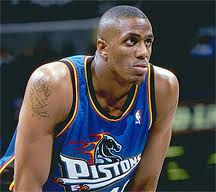Very few people believed the Celtics would come within one quarter of winning the title when the playoffs began. They limped into the playoffs and had been anything but dominant when the regular season ended. But they knew the regular season wasn't about being killers, but was about remaining healthy. Had they been healthy the year before, they probably would have made the finals in consecutive years. With this in mind, they worried more about being able to play as a full squad than seeding or placating their fan base. (To see how put-off their fan base was at the end of the regular season last year check out ESPN's Bill Simmons' playoff predictions. Simmons is an unabashed Celtics fan and had virtually given up on the team.) And their strategy worked. They had a fantastic run in the playoffs and came awfully close to winning the Championship.
As for the Thunder, the regular season had a whole other meaning. They were one of the youngest teams in the NBA and were trying to build winning habits that would endure for seasons to come. Each game had a distinct meaning for them. They wanted to be the team that tried hard on every play and molded their young players into winners. These things can't be accomplished with players and coaches taking nights off. They were not the only team in this category, but they were pretty successful running their operations this way.
So what about this season? Where do teams fall in the "What Does This Regular Season Mean?" hierarchy? Here is my take:
The "Paycheck Please" Teams (These guys are showing up for the paycheck and that is about it. Don't expect much of a fight from any of these franchises. They are going to be bad and ugly.):

Memphis Grizzlies
Sacramento Kings
Charlotte Bobcats
Cleveland Cavaliers
Detroit Pistons
Toronto Raptors
The "Young Guns" Teams (These franchises have young players that could take them to the next level.
 This is motivation enough to not completely give up on things, but they are not going to be extremely competitive yet. This season is about gaining experience and learning the game. They will try hard most nights and the absolute best case would be sneaking into the playoffs.):
This is motivation enough to not completely give up on things, but they are not going to be extremely competitive yet. This season is about gaining experience and learning the game. They will try hard most nights and the absolute best case would be sneaking into the playoffs.):Los Angeles Clippers
Washington Wizards
New Jersey Nets
Golden State Warriors
Minnesota Timberwolves
Milwaukee Bucks

The "Trade Piece" Teams (These teams have pieces they hope to use in a trade. In essence, each game is a chance for the players to showcase their skills and for management to make sure they look good. This usually doesn't result in consistent winning):
Houston Rockets
Philadelphia 76ers
Denver Nuggets
The "Middle Men" Teams (These teams know who they are. They are good enough
 to compete, but not good enough to do anything really memorable. The regular season for these teams is going to be uneven. Some stretches will result in winning and will temporarily build their confidence and other stretches will be harsh reminders that they are not going to compete for a championship.):
to compete, but not good enough to do anything really memorable. The regular season for these teams is going to be uneven. Some stretches will result in winning and will temporarily build their confidence and other stretches will be harsh reminders that they are not going to compete for a championship.):Atlanta Hawks
Indiana Pacers
Portland Trailblazers
Phoenix Suns
New Orleans Hornets

The "Building for the Future" Teams (These teams are going to play really hard each night. They are young, but have some experience and will probably be the elite teams in the future. Each game is a chance to build towards this goal.):
Chicago Bulls
Oklahoma City Thunder
The "Something to Prove" Teams (To these teams, the regular season means the mo
 st. Each of these teams has something to prove. It may be proving that a trade or free agent signing was worth it or it may be trying to prove that you belong in the discussion with the elite franchises in the current NBA. Whatever the reason, these teams will play hard most nights and will achieve very good results in the regular season, relatively speaking. This may result in playoff success, but it isn't a lock.):
st. Each of these teams has something to prove. It may be proving that a trade or free agent signing was worth it or it may be trying to prove that you belong in the discussion with the elite franchises in the current NBA. Whatever the reason, these teams will play hard most nights and will achieve very good results in the regular season, relatively speaking. This may result in playoff success, but it isn't a lock.):New York Knicks
Orlando Magic
Miami Heat
Utah Jazz
Dallas Mavericks

The "Scoff at the Regular Season" Teams (Although these teams may experience a lot of success in the regular season, they could really care less. The only thing left for these teams to accomplish is getting another ring. With that in mind, superstar players will not go hard all the time or they may play reduced minutes. What this really means is that passing judgment on one of these teams based on the regular season is meaningless. Just like the Celtics of '09-'10.):
Boston Celtics
Los Angeles Lakers
San Antonio Spurs
It is fun to sit and wonder which team is better at the turn of the new year, but remember that the regular season takes on different meanings for each team.










